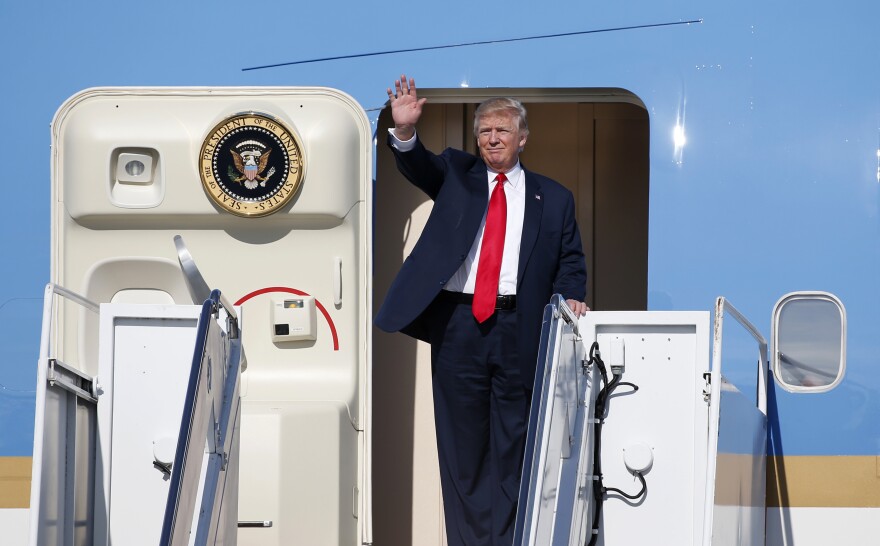President Trump is returning to the campaign trail Saturday night. Yes, it's less than a month into his presidency. But Trump's campaign, which never shut down after he won the election, is organizing the rally in Melbourne, Fla.
It's been a tumultuous start for Trump — from alternative facts about the size of his inauguration crowd, to courts halting his travel ban executive order and this week having to ask his national security adviser to resign. But now Trump is returning to the comfortable embrace of a campaign rally.
Like a rally he held in Minnesota right before the election, Saturday's event will be in an airport hangar. White House spokeswoman Sarah Sanders said on Friday that although the campaign is paying for it, the rally is more for the American people than for Trump's possible 2020 re-election bid. Speaking to reporters on Air Force One, she said Trump feels he needs to take his message directly to the public.
"I think in large part it's because his message when filtered through — unfortunately people standing in this circle don't always do the best job delivering his message," she said, "and nobody does it better than he does."
Holding an actual campaign rally this early in a presidency is unheard of. But getting the heck out of Washington — that is standard operating procedure.
In February of 1993, Bill Clinton traveled to the studios of WXYZ outside of Detroit for a televised town hall, not unlike the many televised town halls he did as a candidate.
"I wanted to come out of the White House, three weeks to the day after I became president," he said, "because I can see now after only three weeks how easy it is for a president to get out of touch, to be caught up in the trappings of Washington and basically to be told by people that nothing needs to change or you can't change things."
Once presidents take office, says political scientist Brendan Doherty, they "like to do what got them into office in the first place."
Doherty, an associate professor at the U.S. Naval Academy, tracks patterns in presidential travel.
"When presidents are tasked with governing, they often return to their favorite campaign practices," he says. "They like to get in front of the people. They like to speak to the crowd. They like to believe in their persuasive powers and their ability to bring people to their side."
And so it was, a month after taking office in 2001, that President George W. Bush hit the road to make a pitch for his tax cut proposal.
"Part of my job as president as well — I might as well be very up front — is to travel the country ginning up support for this plan," he said at the time.
NPR's Don Gonyea was on that trip and called in to All Things Considered to describe the scene as "almost exactly like the kind of event that Mr. Bush appeared at many times during the campaign."
When President Obama went to Elkhart, Ind., in February of 2009 to put pressure on Congress to pass his stimulus bill, it still had the feel of the campaign, with crowds chanting his name.
Obama signed the stimulus into law a little more than a week later. Unlike his predecessor, Trump won't be using this rally to push for any one piece of legislation. He hasn't sent details for any of his major proposals up to Congress yet.
Copyright 2022 NPR. To see more, visit https://www.npr.org.



